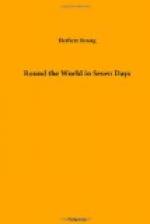Now that it was light, there was no longer the same necessity for keeping out to sea. Indeed, it was merely prudent to come over the land, so that if anything happened to the engine he would at least have an opportunity of descending safely. The engine had worked so well that he scarcely feared a breakdown, but he was not the man to take unnecessary risks.
Glancing at his watch, he calculated that he was about two hours behind time. As he had been flying at full speed except during the storm, he could hardly hope to make up the lost time except by diminishing the intervals for rest which he had allowed for before starting. It was, at any rate, important to lose no more. He had just come to this conclusion when there was a sudden snap in the framework of one of the planes. Looking round anxiously, he at once reduced the speed, feeling very thankful that the mischief had not developed during the storm, when the aeroplane must have inevitably crumpled up. Now, however, the weather was fair, and he could choose his landing-place. He had no doubt that the accident was due to the enormous strain which had been put upon the structure by the storm. A glance showed him that the plane was still rigid enough to stand the strain of motion at a lower speed, but that would neither satisfy him nor achieve success, and so he decided to alight and try to remedy the defect.
As he began to plane downwards, Rodier pointed to a cluster of huts at the mouth of a small river. A dhow lay moored to a rough wooden jetty beyond the hamlet. Between it and the huts was an open space of considerable extent, and though when Rodier first drew his attention to the place they must have been more than a mile distant from it, he could see, even without his binocular, a crowd of people moving about the open space.
“We may find a forge there,” shouted Rodier.
Smith nodded, but he felt a little uneasy. It seemed likely that he had now reached what is known as the Mekran coast, and he remembered the ill reputation it bore with the officers of British ships who had seen service in these waters. The people had been described as greedy, conceited, unwilling, and unreasonable as camels, and their treacherous and cruel disposition was such that, thirty or forty years before, Europeans who landed on any part of their seaboard would have done so at great peril. Smith, however, had a vague recollection of their having been taught a salutary lesson by the Karwan expedition, and no doubt the presence of British war vessels in the Gulf had done something to correct their turbulence. He had to choose between finding a landing-place inland, out of sight of the inhabitants of this fishing village, and landing among them on the chance of getting the use of a forge, for it would probably be necessary to weld the broken stay. Deciding for the latter course, he steered straight for the village, and, circling round it, dropped gently to earth in the open space near the jetty.




